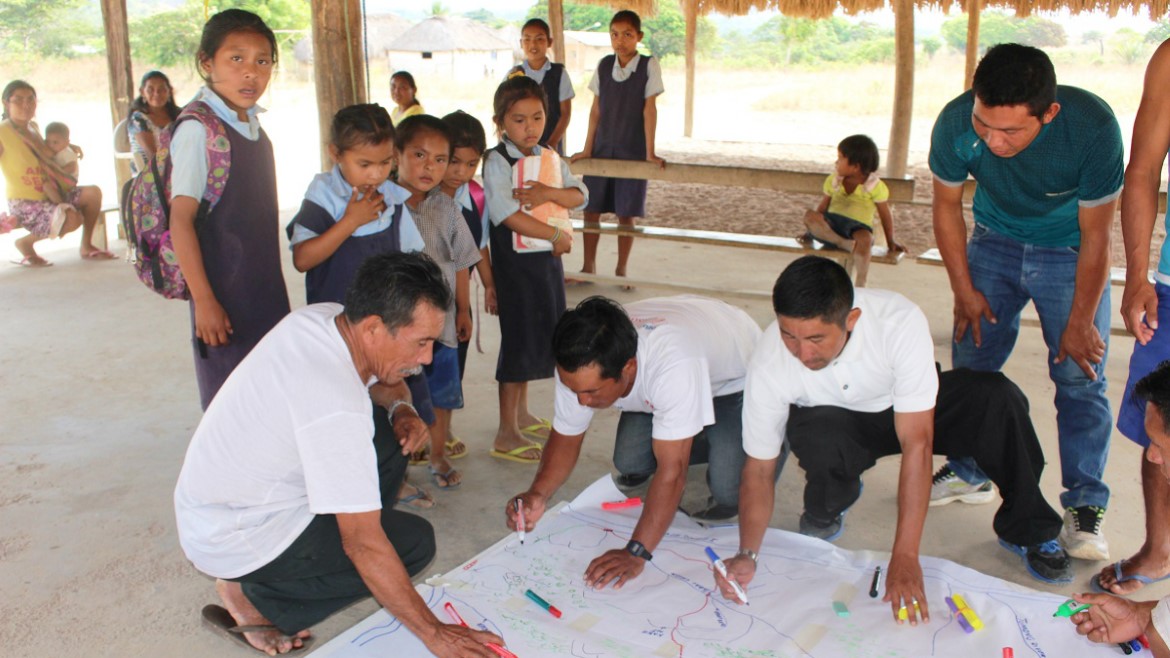
Indigenous peoples as guardians of the rainforest
Organization
Rainforest Foundation Norway (RFN)
Why: Secure rights - save the forest
Most rainforest countries lack adequate policies, incentives and legal frameworks to secure the rights of indigenous peoples and other forest-dependent communities to their traditional lands, territories and resources, despite that it is increasingly acknowledged that this is key to achieve lasting rainforest protection.
The same applies to the post-2020 international climate regime and multilateral REDD+ finance mechanisms. Indigenous peoples and local communities have customary rights to land that are not respected, and their territories are often overlapped by concessions for economic activities such as logging, oil and gas and mining.
Lack of civil society participation in national REDD+ processes and access to and use of information from the ground are other obstacles for effective forest protection.
Budget
Norad originally intended to offer NOK 265 million in total for the period 2016-2020.
Norad was tasked with assessing an additional application from Regnskogfondet on 22.06.18. An addendum totaling 48 914 000 for the period of 2018-2020 was entered into on 06.12.19
Norad intends to offer NOK 255.5 million in total for the period 2016-2020.
What? Rights-based forest protection
Rainforest Foundation Norway (RFN) and our partners in Indonesia, Brazil, DR Congo and Peru aim to advance rights-based rainforest protection in these countries, as well as strengthening the global policy framework for forest protection.
We aim to reach this through mapping and documentation of indigenous territories, capacity building of partners and indigenous peoples’ communities, developing models for sustainable forest management, and advocacy work to influence donors and improve the international policy framework and institutions for REDD+ and forest protection.
The programme aims to facilitate constructive cooperation between civil society, national authorities and multilateral institutions towards the development and implementation of coherent policies for rights-based, sustainable management of forests.
- Indigenous peoples and civil society organisations must gain the expertise and capacity needed for them to effectively influence relevant forest policies.
- National and local governments must recognise the multiple and long-term benefits of protecting the rainforest, and respect, implement and consolidate the rights of indigenous peoples.
- Country-specific finance mechanisms must incentivise sustainable community-based forest management, including in indigenous territories.
- UNFCCC and multilateral finance instruments for REDD+ must trigger national, transformative REDD+ processes that include participation of all relevant stakeholders, safeguards, transparency in the use of funds, and ensure that the rights of indigenous peoples and other forest-dependent communities are respected.
- Key REDD+ donor countries must emphasise that indigenous peoples’ rights to land, territories and resources, as well as good forest governance, are core enablers of REDD+ in all programmes that they fund. They must also ensure that safeguards are respected and that fundamental reforms are implemented.
Expected results: Indigenous peoples enjoy greater respect for their land rights
The program has two expected outcomes:
1) The international climate regime for land-use and forests includes a rights-based approach and provisions to protect natural ecosystems, and
2) Indigenous peoples and other forest-dependent communities enjoy greater respect for their land rights and are recognized for their sustainable management and protection of the rainforest.
Norad was tasked with assessing an additional application from Regnskogfondet on 22.06.18.
An addendum totaling 48 914 000 for the period of 2018-2020 was entered into on 06.12.19 to achieve the following objectives:
- Increased land use ambition in climate plans of Brazil, Indonesia and Peru,
- Security for environmental human rights defenders at risk in Colombia and the DRC,
- Develop enabling conditions for net zero deforestation in Peru and strengthened indigenous territorial management and regulation of palm oil industry and other deforestation mega-drivers.
Partners and geographic location
Indonesia: Warsi (Sumatra), Walhi Kalteng (Central Kalimantan), Paradisea (West Papua), Perempuan AMAN (National indigenous association)
Brazil: Instituto Socioambiental/ISA (National), Rede de Cooperação Amazônica/ RCA (Network consisting of nine indigenous and four pro-indigenous organisations that work primarily in the Amazon)
Peru: ‘Rights, Environment and Natural Resources’/DAR (National NGO)
DR Congo: ‘Groupe de Travail Climat REDD Renové’/GTCR-R (National network of over 300 civil society organizations)
Global: Friends of the Earth Norway.
About the project descriptions
The project descriptions give insight in the NICFI portfolio for civil society organisations supported by Norad.
The descriptions presented are written by the project partners. Only minor edits have been undertaken by Norad. Their presentations and conclusions do not necessarily reflect the views of Norad.
